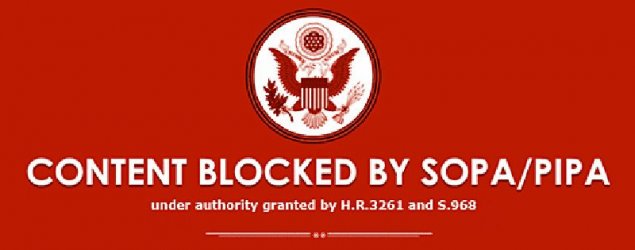From Wikipedia
http://en.wikipedia.org/wiki/Stop_Online_Piracy_Act [h=2]Impact on websites[/h] [h=3]Websites that host user content[/h] Opponents have warned that SOPA would have a negative impact on online communities. Journalist
Rebecca MacKinnon argued in an
op-ed that making companies liable for users' actions could have a
chilling effect on user-generated sites such as
YouTube. "The intention is not the same as
China’s Great Firewall, a nationwide system of Web censorship, but the practical effect could be similar," she says.[SUP]
[29][/SUP] The
Electronic Freedom Foundation (EFF) warned that websites
Etsy,
Flickr and
Vimeo all seemed likely to shut down if the bill becomes law.[SUP]
[30][/SUP] Policy analysts for
New America Foundation say this legislation would enable law enforcement to take down an entire domain due to something posted on a single blog, arguing, "an entire largely innocent online community could be punished for the actions of a tiny minority."[SUP]
[31][/SUP]
Additional concerns include the impact on common Internet functions such as
linking or access data from the cloud. EFF claimed the bill would ban linking to sites deemed offending, even in search results[SUP]
[32][/SUP] and on services such as
Twitter.[SUP]
[33][/SUP] Christian Dawson,
Chief Operating Officer (COO) of Virginia-based hosting company
ServInt, predicted that the legislation would lead to many
cloud computing and Web hosting services moving out of the US to avoid lawsuits.[SUP]
[34][/SUP] The
Electronic Frontier Foundation have stated that the requirement that any site must self-police user generated content would impose significant liability costs and explains "why venture capitalists have said en masse they won’t invest in online startups if PIPA and SOPA pass."[SUP]
[35][/SUP]
Proponents of the bill countered these claims, arguing that filtering is already common. Michael O'Leary of the MPAA testified on November 16 that the act's effect on business would be more minimal, noting that at least 16 countries already block websites, and that the Internet still functions in those countries.[SUP]
[36][/SUP] MPAA Chairman
Chris Dodd noted that Google figured out how to block sites when China requested it.[SUP]
[37][/SUP] Some ISPs in Denmark, Finland, Ireland and Italy blocked
The Pirate Bay after courts ruled in favor of music and film industry litigation, and a coalition of film and record companies has threatened to sue
British Telecom if it does not follow suit.[SUP]
[38][/SUP]
Maria Pallante of the
US Copyright Office said that Congress has updated the
Copyright Act before and should again, or "the U.S. copyright system will ultimately fail." Asked for clarification, she said that the US currently lacks jurisdiction over websites in other countries.[SUP]
[36][/SUP]
[h=3]Weakening of "safe harbor" protections[/h] The 1998
Digital Millennium Copyright Act (DMCA) includes the
Online Copyright Infringement Liability Limitation Act, that provides a "safe harbor" for websites that host content. Under that provision, copyright owners who felt that a site was hosting infringing content are required to request the site to remove the infringing material within a certain amount of time.[SUP]
[39][/SUP][SUP]
[40][/SUP][SUP]
[41][/SUP] SOPA would bypass this "safe harbor" provision by placing the responsibility for detecting and policing infringement onto the site itself, and allowing judges to block access to websites "dedicated to theft of U.S. property."[SUP]
[42][/SUP]
According to critics of the bill such as the
Center for Democracy and Technology and the
Electronic Frontier Foundation, the bill's wording is vague enough that a single complaint about a site could be enough to block it, with the
burden of proof resting on the site. A provision in the bill states that any site would be blocked that "is taking, or has taken deliberate actions to avoid confirming a high probability of the use of the U.S.-directed site to carry out acts that constitute a violation." Critics have read this to mean that a site must actively monitor its content and identify violations to avoid blocking, rather than relying on others to notify it of such violations.[SUP]
[30][/SUP][SUP]
[43][/SUP]
Law professor Jason Mazzone wrote, "Damages are also not available to the site owner unless a claimant 'knowingly materially' misrepresented that the law covers the targeted site, a difficult legal test to meet. The owner of the site can issue a counter-notice to restore payment processing and advertising but services need not comply with the counter-notice."[SUP]
[44][/SUP]
Goodlatte stated, "We're open to working with them on language to narrow [the bill's provisions], but I think it is unrealistic to think we're going to continue to rely on the DMCA notice-and-takedown provision. Anybody who is involved in providing services on the Internet would be expected to do some things. But we are very open to tweaking the language to ensure we don't impose extraordinary burdens on legitimate companies as long as they aren't the primary purveyors [of pirated content]."[SUP]
[45][/SUP][SUP]
[46][/SUP]
O'Leary submitted written testimony in favor of the bill that expressed guarded support of current DMCA provisions. "Where these sites are legitimate and make good faith efforts to respond to our requests, this model works with varying degrees of effectiveness," O'Leary wrote. "It does not, however, always work quickly, and it is not perfect, but it works."[SUP]
[17][/SUP]

